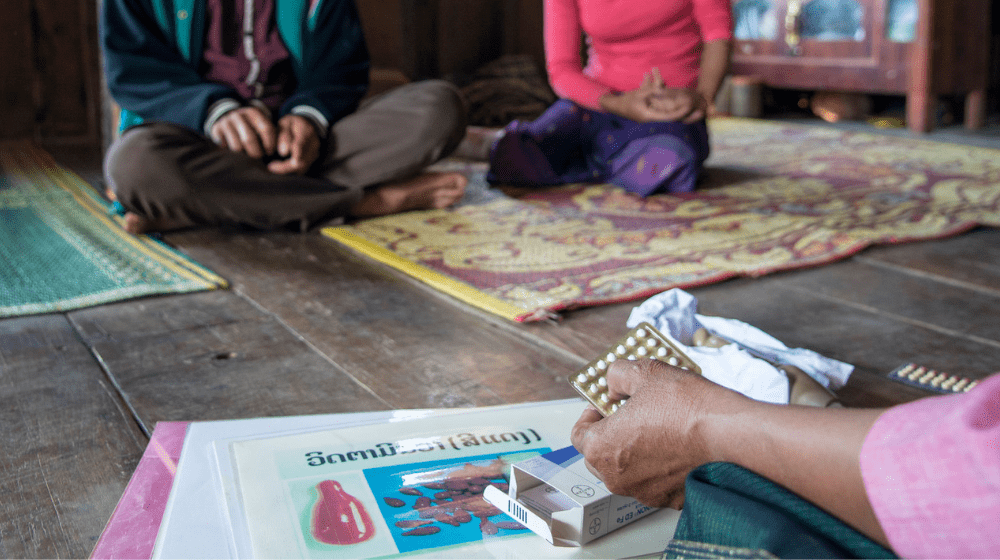“We have four kids, we are happy now and we do not want any more children. so, I decided to undergo a vasectomy. I believe that family planning is a couple’s matter. Therefore, my wife and I discuss and decide together who to use contraceptives”, said Mr. Xay (pseudonym) from Nakhone Luang Prabang, Luang Prabang Province.
A vasectomy is minor surgery to block sperm from reaching the semen in ejaculate so that pregnancy cannot occur. When this subject came up in the discussion with his wife, Xay was reluctant, just like many other men. But he quickly realized the reasons behind such reluctance: fear and misconception towards male sterilization. “Often, men are afraid that sterilization would cause sexual dysfunction or affect their masculinity. So they refuse to do it.”
But what made Xay decide to undergo vasectomy is compassion combined with fact-based decisions making. He recalls the time when his wife went through her four pregnancies and child births and suffered side effects from contraceptives. He does not want her to endure any more pain and suffering. He knows that it is the right thing to do to take care of his wife, he said, “I want her to stay healthy and happy.”
“Talking to the doctor was key, and it helped me better understand about sterilization and made me feel comfortable and confident to do it,” said Xay, who had a vasectomy six months ago, consulted with the doctors together with his wife many times before making an informed decision.
After the vasectomy, Xay recovered quickly within a month and can go about his life as usual. Xay calls for other men to always do research and consult with the doctor to understand sterilization. “If we have accurate information and do enough research, talk to the doctor, and the men who did it before, then we know that what we heard outside is not always true; there are a lot of rumors and misinformation around sterilization.”
Receiving accurate information is essential, but Xay also acknowledges that cultural perception can also get in the way of couples sharing responsibility for the use of contraceptives. “Besides, most people think that women are the only contraceptive users and very few men take up Family Planning methods,” Xay added.
In Lao PDR, 46% of married women of reproductive age (or their partners) don’t use contraception. Amongst married couples, only 1.1% use male condoms, and men who have undergone sterilization are rare (0.3% in Bokeo, 0.1% in Sekong and Xaysomboun). Amongst unmarried women who are sexually active, the use of contraception is only 14.8%.
Xay believes that the public must be aware of family planning as a couple’s shared responsibility. Whether a wife or a husband decides to undertake any contraceptive methods, accurate information and quality services on family planning must be accessible and available for everyone everywhere.
UNFPA supports the Government of Laos to realize universal access to sexual and reproductive health, including family planning information and services for all through health system strengthening, capacity building, and quality service provision. Male and Boys engagement approaches are applied throughout the innovative interventions, including, Service Delivery: Telehealth, youth-friendly service hotlines, mobile health outreach. Online resources such as Noi-Yakhoo mobile app and more recent online learning tools since COVID19 related lockdowns, and hotlines managed by the Vientiane Youth Center. These are complemented by in-school comprehensive sexuality education through the school curriculum and community based and peer led interventions for out of school youth and communities. These interventions are led by Line Ministries, supported by UNFPA and have been possible thanks to the various donors and partners such as The Government of Luxembourg, KOFIH, KOICA, PSI, CHAI, Plan International, ADRA, WB, SRC, PFHA, LaoPHA.
UNFPA will continue its support to the Lao Government to increase the availability and diversity of contraceptives as part of ICPD25 commitments to uphold the rights of individuals and couples on their sexual and reproductive health - every woman and man, every couple can make an informed decision and choose the method that best suits them.
******************************
Names in the article have been changed to protect the privacy of the individual.
Data source: LSIS 2017
For more information please contact:
Ms. Oulayvanh Sayarath
National Program Analyst, UNFPA Laos
Ms. Vanly Lorkuangming
Communications and Partnership Analyst, UNFPA Laos
Email: lorkuangming@unfpa.org


